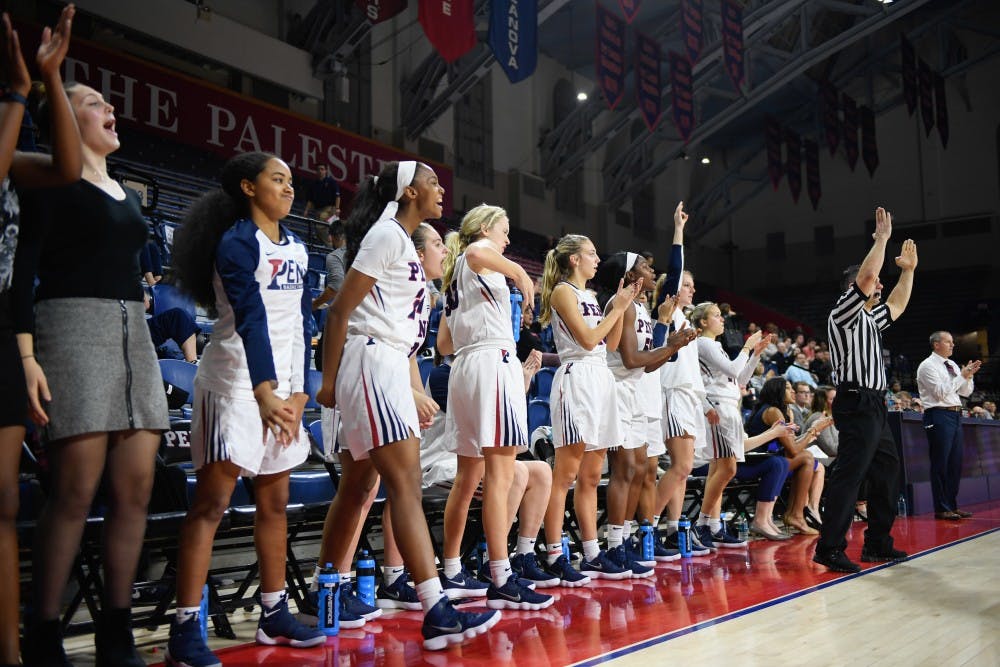
Penn women's basketball is on a roll that includes a Big 5 title, three dominant Ivy weekend sweeps, and a nine game winning streak.
Credit: Zach SheldonThey stumbled out of the gate, but Penn women’s basketball is exactly what we thought they were: a team that should win the Ivy title.
Coach Mike McLaughlin has lead his team to back-to-back conference titles, including last year’s triumph at the inaugural Ivy Tournament. This year, the gap between Penn and the rest of the league has closed – or at least, the gap between Penn and Princeton has. Want proof? Harvard, the next closest team behind Penn and Princeton, is now two games back after two straight blowout losses to those two teams.
Last season’s runner-up, Princeton shocked the Red and Blue in their conference opener last month by a score of 70-55. It was the worst possible start to Ivy play for Penn, one that meant they had to work themselves back to the top of the league the hard way. Now, after three straight Ivy weekend sweeps, Penn finds itself in a tie for first in the conference with the only team they have yet to beat.
Since that loss to Princeton, Penn has won nine straight, including two Big 5 title clinching wins over Villanova and Temple. Of those nine, only the two-point win over ‘Nova was within 15 points – that’s right, Penn has won eight of its last nine, including six Ivy and one Big 5 matchups – by a margin of 15 or more.
So what’s the lesson?
First of all, not to panic. One loss in the Ivy League is anything but a death sentence; both of the last two years Penn has won it all with a one-loss record. Even if the Quakers drop another game, the Ivy Tournament and the home court advantage it provides make perfection less of a necessity.
That doesn’t mean it shouldn’t be strived for or even achieved. Penn has the talent to go perfect in the conference, fluky opening losses notwithstanding. This team has high standards: like last year, the goal shouldn’t be to qualify for the tournament, or even to win it. The Quakers should strive to pull of the double: win both the regular season and tournament conference titles. And, optimistically, to win a game even after that.
The second lesson from Penn’s recent run of play is that the Quakers are who we thought they were. They didn’t always show it early in the season, but this is a good basketball team by any standard. They have the best frontcourt in the conference in reigning Ivy Player of the Year Michelle Nwokedi and presumptive Ivy Rookie of the Year Eleah Parker. They have one of the better defenses in the country (the Quakers are 27th nationally in points allowed per game), a great stable of guards, and a coach who has been there and done that.
Princeton is a good team, too, which is why Tuesday’s game will be so fun to watch. The Tigers are just as good, if not better, defensively. They have one of the better players in the league in Bela Alarie, and when their three ball is on like it was in January, they are nigh unstoppable.
While it will be just the eighth conference game of the season for both these teams, Tuesday’s game will likely decide the league. The top seed is up for grabs.
It will be low-scoring, physical, and spirited in Jadwin Gym. Here’s what it comes down to: who wins the guard matchups? How will seniors Anna Ross and Lauren Whitlatch match-up against Princeton’s Gabrielle Rush’s sharpshooting and Alarie’s versatility? Down low, will Penn win on the glass and prevent the Tigers’ Leslie Robinson from racking up easy buckets?
I think the Quakers win those matchups. As McLaughlin put it, “We’re better than we were then [in January].”
The Quakers are better than they were in January and certainly better than they were on January 6th. Nwokedi and Parker are more comfortable playing off each other, as Nwokedi’s 30-point outburst on Saturday proved. Junior Ashely Russell’s role as the gritty defender has come into focus. Three-point shooting is up too.
Penn should win this game.
Because they are who we think they are.

Theodoros Papazekos is a College sophomore from Pittsburgh, Pa., and is a Sports Editor for The Daily Pennsylvanian. He can be reached at papazekos@thedp.com.
The Daily Pennsylvanian is an independent, student-run newspaper. Please consider making a donation to support the coverage that shapes the University. Your generosity ensures a future of strong journalism at Penn.
Donate




